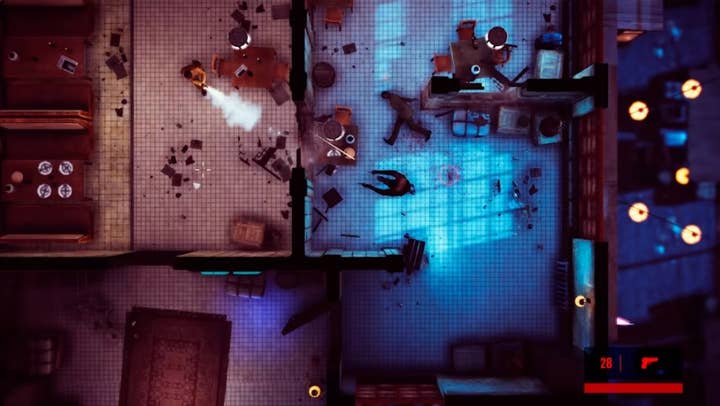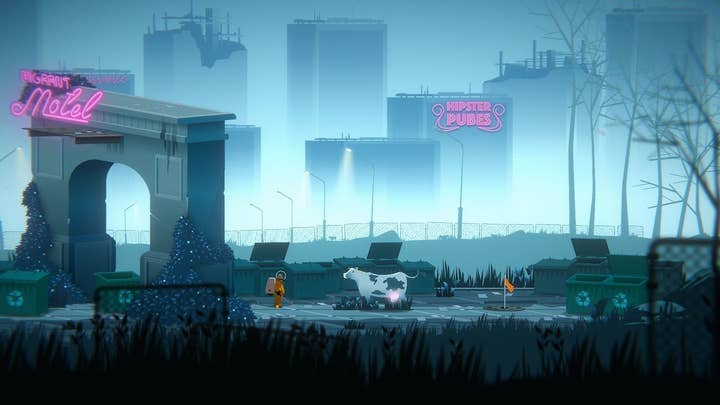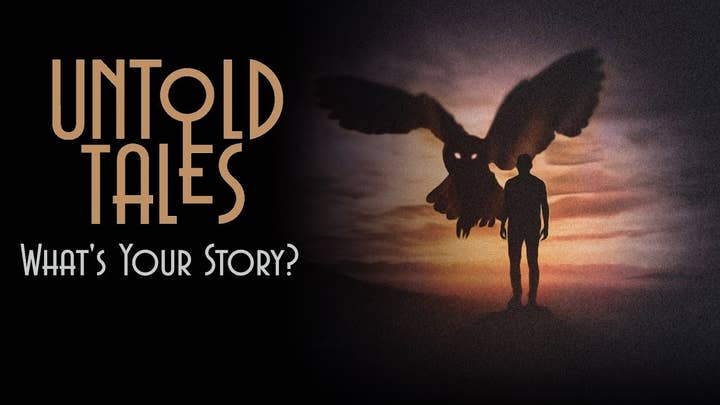Lessons learned from getting an indie publisher off the ground
Untold Tales CEO Maciej Łączny reflects on what went right and wrong in launching the indie publishing outfit
It was about a year and a half ago that a group of former Techland developers announced their new indie publishing outfit Untold Tales, along with their intent to "cut the crap" from the publisher-developer relationship.
In a discussion to touch base and share a progress report on how that plan is turning out, Untold Tales CEO Maciej Łączny tells GamesIndustry.biz the company's life has been eventful at the very least.
"It was a roller coaster journey, I think it went even faster and more than we expected," Łączny says.
Ramping up quickly
The company was founded in August of 2020 with just four people, some investment backing, and a promise to build its deals on transparency, trust, and common understanding.
That pitch was apparently appealing. By the end of 2020 -- just three and a half months after forming -- Untold Tales had signed five titles and even launched one of them: the Switch version of Hong Kong Massacre.

The pace didn't let up much in 2021. The team grew to 20 people over the course of the year, and they published more titles: Beautiful Desolation, Aspire: Ina's Tale, Golf Club: Wasteland, and Arise: A Simple Story.
Including released titles, Untold Tales now has ten projects under its belt.
"It looks like an easy ride, but there are some things we really got to know along the way," Łączny says.
"Most of us come from the AAA industry. We worked on the development end dealing with a lot of big titles in the past and not all of those learnings can be transferred to the smaller-scale indie market."
What went right
When asked what went right with Untold Tales in its first year and a half, Łączny zeroes in on the original vision they had in starting the company.
"That's very important in the first months, being very clear about your brand and the vision of the brand going forward," he says.
"We knew we wanted to be in the indie sector, strongly focused on story-driven titles, and when building out the brand and talking to the first, the fifth, and the 50th developer, we were very clear about the fact that certain games are not for us."
Łączny notes that different publishers have different styles and different areas of expertise, so it was important for Untold Tales to take on only those projects that best matched its own.
"I believe the perception of how devs around the world saw us as a quality team that is understanding development cycles, and how we interacted with the teams," Łączny says. "If you look at the scale of how close a publisher can be to the development of the game, we were as close as possible, but not getting involved and jumping into the shoes of the devs. We were serving our best knowledge experience, and very frequent feedback."
That balance of being helpful but not overbearing was apparently appreciated by at least one of Untold Tales' early business partners, as Łączny notes that the publisher has already had its first studio sign up to release a second title through the company, a milestone he describes as particularly rewarding.
"If someone is wanting to really conquer the world in the publishing area, you cannot build a wide network from scratch in a couple weeks"
Team building was another essential task that Untold Tales did well with, Łączny says. The first name he brings up is the company's head of business development Paulina Kwiecinska, a 15-year veteran of the industry who came over from Techland partway through 2021.
"What she brought with her was her wide network of global reach," Łączny says. "Even though most of us work from Poland, we're spread around the world, and our network is completely not Polish. We have teams and games signed in Brazil, Chile, we're talking to Americans, Serbians, we have games signed in Hong Kong, England, South Africa..."
He also noted Paul Milewski of PR and marketing firm WireTap Media, who previous served as Techland's international PR manager and marketing coordinator but is now heading the PR and media push. As with Kwiecinska, Milewski is based in Poland but has built a network extending far beyond its borders.
"It gave us this locally based but globally focused company, and that came with all the experience of the people we brought on board," Łączny says. "If someone is wanting to really conquer the world in the publishing area, you cannot build a wide network from scratch in a couple weeks. Bringing on additional people with experience really opens up the door because this is still the gaming industry. It's not so big, and network connections and experience really help with that."
What went wrong
This one would likely be on everyone's list of what went wrong the past couple years, but COVID happened. And even though the pandemic was well underway when Untold Tales first formed, it was still a complicating factor.
"We got hit pretty badly a few times in relation to the complexities of how different teams globally will work and can deliver according to how they planned it," Łączny says.
From key individuals needing to be off or quarantining for weeks to troubles delivering dev kits where they needed to be, the pandemic complications were numerous.
"Those little things were really quite a big obstacle for us, and impacted the release calendar," Łączny says. "You can imagine for a company our size where we have ten signed games, it's already a bit of a headache."
The lack of in-person events also hurt more than expected.
"We didn't foresee the impact of even wider networking during Gamescom and all the PAXes we were planning to be present, where you can have a physical impact talking to influencers, talking to the first-parties, talking to other publishers," Łączny says. "Those [laptop] cameras and constant [virtual] meetings are not as efficient as two weeks at PAX or a couple days at GDC where you can handshake and get stuff done while having a bowl of poke."
They also learned a lot about different consumer groups and their purchase behaviors and price sensitivities, as Łączny says, "Eye-catching products on sale are way more attractive than they used to be a couple years ago."
"I think the biggest difference is the scale of the budgets and outreach turns into this 'smart marketing' approach," he says. "Not everyone is going to simply pay attention to one of the million indie titles being released around the world, so you need to be creative on a different level to get the attention of the market."
This is one of those areas where the Untold Tales story diverged most drastically from what the founders had experienced at Techland.
"The big learning is that not all the mechanisms and partnerships from the very high-end of the gaming industry can be easily translated into the indie sector"
"When you're working in AAA, these campaigns last three, maybe four years in some cases," Łączny says. "There's tons of heavy money going into building brand awareness, building wishlists, having very big teams of 50-plus people (plus the big agencies) pushing a lot of content to the market, getting and feeding the attention of big influencers.
"In our case, we need to maneuver much smarter than we used to do back in the day. The big learning is that not all the mechanisms and partnerships from the very high-end of the gaming industry can be easily translated into the indie sector."
Łączny points to Golf Club Wasteland as evidence of that.

"First of all, we looked at each of our games to see what's unique in the [narrative-driven] sector about what they want to say, and then we built the fantasy and marketing campaign around it," he explains.
"Golf Club Wasteland was a fantasy built on the lonely golfer that came to a fallen earth ruined by the big corporations, basically a wasteland. We were trying to pull a lot of attention to this global warming problem, the corporations being greedy and everything else, and that was building the community behind the awareness that there was a bigger value to the game, and bringing attention to that."
To do that, Untold Tales pushed on word-of-mouth marketing and not hesitating to extend beyond the narrow confines of standard game promotion. Instead of simply posting about features or putting calls to action to build wishlist numbers, they would post information about golf, or Earth itself. They tried to build a greater story around the game and found the game's community eventually began to start living on its own and helping with the marketing message.
While AAA games don't lack for word-of-mouth marketing, Łączny says AAA studios can essentially manufacture interest, where indies have to speak to some existing appeal that doesn't need to be built from scratch.
"AAA go more on the fact that they have amazing assets, amazing trailers," he says. "Those big AAA titles create certain fantasies; we just had to find way to surf on the wave of a fantasy we would not be able to create for an indie title."
Know when to walk away
When asked if Untold Tales has had trouble standing out from the flood of other independent publishers in the market, Łączny says it hasn't actually been a huge problem. The developers Untold Tales speaks with often tell him the company's competition is actually coming from bigger names, which can be as complimentary as it can be concerning.
"Not all of the fights are worth fighting"
"You have to pick your fights as well," Łączny says. "Not all of the fights are worth fighting. If the developers are willing to go with a more famous brand publisher, eventually they will turn to that.
"In this case, being very clear and honest from the beginning always pays off. What we can offer is a very particular and very individual approach towards the game where the team is going to be fully committed for a certain amount of time on the marketing campaign just for that one title."
Just as Untold Tales doesn't seem prepared to chase a game if the developer has their heart set on a larger competitor, Łączny also notes that there are perfectly promising titles it will still pass on if the developer-publisher match isn't a natural one.
"We have learned not to ignore those early signals that come from your gut, like if you go to your first meeting and there's no chemistry or flow in the discussion," he says.
"We've turned down a couple very interesting games in the last year and a half because there was no chemistry. We couldn't find a common language talking about the game, and we couldn't imagine it was going to be like that for the next year and a half, or two or three including time post-release. So we have very transparently said this is probably not the best match and tries to point them to other publishers we believe would be a better match."
Staying agile
The big learning Łączny takes from Untold Tales' experience to date is the necessity to stay on one's toes.
"If you want to survive in a very competitive market -- either in the development or publishing end -- you need to be agile in seeing opportunities and translating certain threats into an opportunity.
Even the company's original pitch to "cut the crap" and make its deal straightforward has undergone constant revision. Łączny still isn't keen on 50-page publishing agreements, but he says the company's basic template agreement is under regular revision, and often tailored to the needs of each individual developer and deal.
"The situation globally changes, and we react to the world and the feedback of the devs," Łączny says. "We keep on updating, simplifying, seeing what parts devs don't really like. We're working on the template agreement constantly, trying to improve it for the sake of clarity."
The idea is that if the two sides are willing enough to do business with each other that they'll start talking about contract specifics, Łączny wants a template that can get the specific contractual language finalized and signed as quickly and easily as possible.
The latest example of that agility is Untold Tales extension of its publishing services to an a la carte option.
"There were quite a few situations where we found developers having enough cash to finance their projects and they just wanted to build their own teams but didn't know how, so they were asking us if we could help them out and become their team."
So if developers want to keep all the IP rights or self-publish their titles, that can still happen, with Untold Tales offering services like PR, marketing, media and influencer support, first-party submissions, and porting as and where needed.
"The vision and clarity can still be kept, but opportunities need to be addressed," Łączny says.
"The dynamics of the gaming industry are such that if anyone is standing still, they won't survive. Change is constant, and it's happening right outside our windows."

